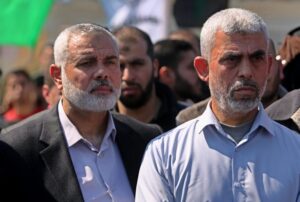Demystifying how the Hamas leadership works

Yahya Sinwar (R) and Ismail Haniyeh (L) attending the funeral of Hamas official Mazen Foqaha in Gaza City on 25 March 2017
Hanna Alshaikh writes in Mondoweiss on 30 August 2024:
After Ismail Haniyeh, head of the Hamas Political Bureau, was assassinated in Tehran, the Movement’s senior consultative body, the Shura Council, quickly and unanimously chose Yahya Sinwar as his successor. At the time of his killing, Haniyeh had been leading the Hamas effort in the ceasefire negotiations with mediators, and many analysts claimed that Sinwar’s rise signaled a total break with the policies of Haniyeh and other senior Political Bureau members.
Much of this analysis is misinformed.
It betrays a shallow understanding of not just the leaders of the Islamic Resistance Movement (Hamas), but the wider Movement as a whole. The assumption that Sinwar’s leadership is a rupture with the past follows a tendency in Western analysis to view Palestinian leaders through vague, simplistic binaries like “hawk vs. dove” or “moderate vs. hardliner.” These labels conceal more than they reveal.
Compounding this analytic flaw is the sensationalized fixation on Yahya Sinwar’s psychology. This approach reduces complex politics to personalities and assumes that Hamas’s decision-making is largely personality-driven rather than the product of robust internal debates and elections, complex deliberation and consultation, and institutional accountability.
Despite these flaws in the wider conversation, it is nonetheless worth exploring the extent to which Sinwar’s tenure will differ from Haniyeh’s as Head of the Political Bureau. Does this signal a rupture?
Defying isolation
To assess the question of a rupture, it is worth considering some parallels in the trajectories of Haniyeh and Sinwar. On the most obvious level, each eventually became the head of the Gaza leadership and then the head of the Hamas Political Bureau. Born in Gaza Strip refugee camps in the early 1960s, Haniyeh and Sinwar entered the world as refugees, which entailed an existence based on exclusion, dispossession, and marginalization. In defiance of these conditions, both leaders joined the Islamic movement in Gaza and found themselves further isolated and dislocated: Haniyeh was exiled to the Lebanese town of Marj al-Zouhour in 1992, and Sinwar was imprisoned in 1988 and given a quadruple life sentence the following year. These challenges did not stop either leader from developing not just their own political knowledge, but playing a role in developing Hamas itself.
